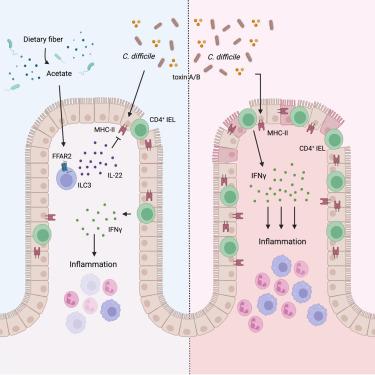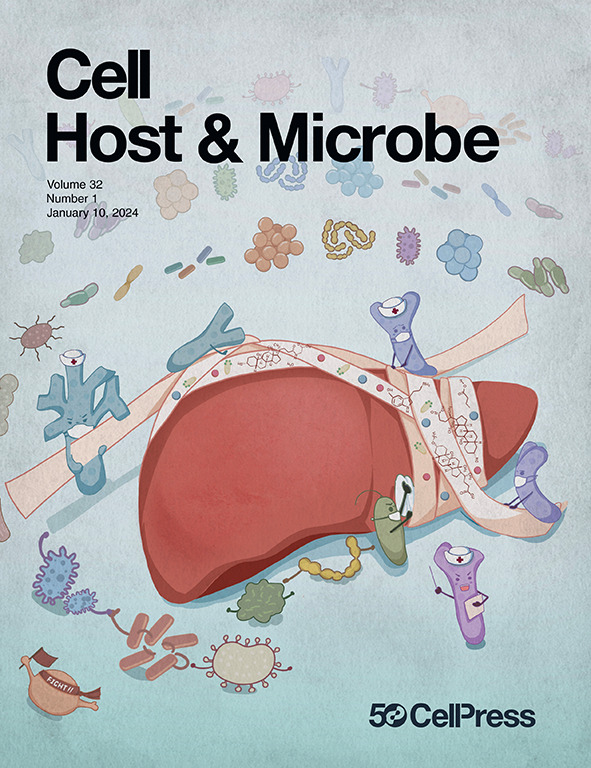Fiber- and acetate-mediated modulation of MHC-II expression on intestinal epithelium protects from Clostridioides difficile infection
IF 20.6
1区 医学
Q1 MICROBIOLOGY
引用次数: 0
Abstract
Here, we explore the relationship between dietary fibers, colonic epithelium major histocompatibility complex class II (MHC-II) expression, and immune cell interactions in regulating susceptibility to Clostridioides difficile infection (CDI). We find that a low-fiber diet increases MHC-II expression in the colonic epithelium, which, in turn, worsens CDI by promoting the development of pathogenic CD4+ intraepithelial lymphocytes (IELs). The influence of dietary fibers on MHC-II expression is mediated by its metabolic product, acetate, and its receptor, free fatty acid receptor 2 (FFAR2). While acetate activation of FFAR2 on epithelial cells helps resist CDI, it does not directly regulate MHC-II expression. Instead, MHC-II is regulated by FFAR2 in type 3 innate lymphoid cells (ILC3s). Acetate enhances interleukin-22 (IL-22) production by ILC3s, which then suppresses MHC-II expression on the colonic epithelium. In conclusion, a low-fiber diet reduces acetate-induced IL-22 production by ILC3s, leading to increased MHC-II on the colonic epithelium. This change affects recovery from CDI by expanding the population of pathogenic CD4+ IELs.

纤维和醋酸盐介导的肠上皮MHC-II表达调节可保护肠上皮免受艰难梭菌感染
在这里,我们探讨了膳食纤维、结肠上皮主要组织相容性复合体II类(MHC-II)表达和免疫细胞相互作用在调节艰难梭菌感染(CDI)易感性中的关系。我们发现低纤维饮食增加了结肠上皮中MHC-II的表达,这反过来又通过促进致病性CD4+上皮内淋巴细胞(iel)的发展而恶化了CDI。膳食纤维对MHC-II表达的影响是通过其代谢产物醋酸酯及其受体游离脂肪酸受体2 (FFAR2)介导的。虽然上皮细胞上FFAR2的醋酸活化有助于抵抗CDI,但它并不直接调节MHC-II的表达。相反,MHC-II在3型先天淋巴样细胞(ILC3s)中由FFAR2调节。醋酸盐通过ILC3s增强白细胞介素-22 (IL-22)的产生,进而抑制结肠上皮上MHC-II的表达。综上所述,低纤维饮食减少了醋酸盐诱导的ILC3s产生IL-22,导致结肠上皮上MHC-II增加。这种变化通过扩大致病性CD4+ IELs的数量影响CDI的恢复。
本文章由计算机程序翻译,如有差异,请以英文原文为准。
求助全文
约1分钟内获得全文
求助全文
来源期刊

Cell host & microbe
生物-微生物学
CiteScore
45.10
自引率
1.70%
发文量
201
审稿时长
4-8 weeks
期刊介绍:
Cell Host & Microbe is a scientific journal that was launched in March 2007. The journal aims to provide a platform for scientists to exchange ideas and concepts related to the study of microbes and their interaction with host organisms at a molecular, cellular, and immune level. It publishes novel findings on a wide range of microorganisms including bacteria, fungi, parasites, and viruses. The journal focuses on the interface between the microbe and its host, whether the host is a vertebrate, invertebrate, or plant, and whether the microbe is pathogenic, non-pathogenic, or commensal. The integrated study of microbes and their interactions with each other, their host, and the cellular environment they inhabit is a unifying theme of the journal. The published work in Cell Host & Microbe is expected to be of exceptional significance within its field and also of interest to researchers in other areas. In addition to primary research articles, the journal features expert analysis, commentary, and reviews on current topics of interest in the field.
 求助内容:
求助内容: 应助结果提醒方式:
应助结果提醒方式:


